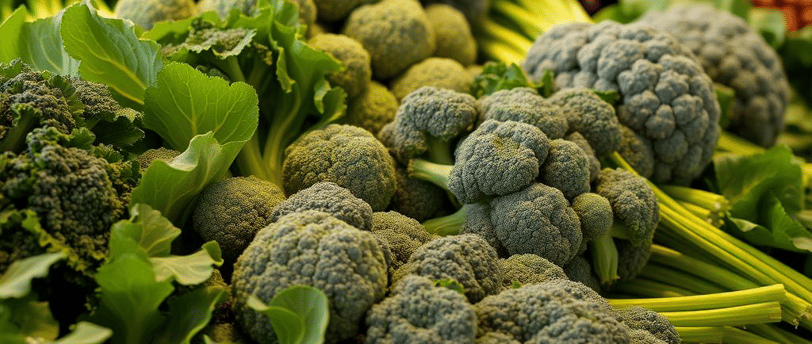Support Your Liver for Healthy Estrogen Levels – Eat Cruciferous Vegetables Like Broccoli, Kale, and Cabbage
🧘WELLNESS TIPS🌸 HORMONAL BALANCE & WOMEN’S WELLNESS


In recent years, the significance of liver health has gained attention in the realm of holistic wellness. One of the primary roles of the liver is the metabolism of hormones, particularly estrogen, which has profound effects on various bodily functions. With rising concerns about hormonally driven conditions, understanding how to support liver function naturally becomes crucial. A particularly effective way to bolster hepatic health and maintain balanced estrogen levels is through the consumption of cruciferous vegetables such as broccoli, kale, and cabbage.
The Liver's Role in Estrogen Metabolism
The liver performs a myriad of essential functions, including detoxification, protein synthesis, and the production of biochemicals necessary for digestion. However, one of its critical roles is the metabolism of hormones, specifically estrogen. Estrogen, while essential for reproductive health, can lead to various health issues when present in excessive amounts, such as hormonal imbalances, weight gain, and even certain cancers.
The liver helps break down estrogen into forms that can be eliminated from the body. If liver function is compromised, it can lead to the accumulation of unused hormones, potentially resulting in symptoms such as menstrual irregularities, mood swings, and increased risk of hormone-related diseases. This is where diet comes into play, and particularly, the intake of cruciferous vegetables can offer substantial support.
What Are Cruciferous Vegetables?
Cruciferous vegetables, belonging to the Brassicaceae family, include a variety of nutrient-dense foods such as broccoli, kale, cauliflower, Brussels sprouts, and cabbage. These veggies are known not just for their taste but also for their impressive health benefits, supported by scientific evidence. They are rich in vitamins C and E, fiber, and various phytonutrients, making them a pivotal part of a healthy diet.
How Do Cruciferous Vegetables Support Liver Health?
1. Rich in Glucosinolates
Cruciferous vegetables contain unique compounds known as glucosinolates. Upon digestion, these compounds break down into active metabolites that can help the liver detoxify and metabolize estrogen more effectively. Scientific evidence suggests that glucosinolates may also induce the liver’s phase II detoxification enzymes, improving the breakdown and elimination of excess estrogen.
2. Promote Sulfur Production
Cruciferous vegetables are also excellent sources of sulfur, an essential element that plays a vital role in liver function. Sulfur helps to produce glutathione, one of the body’s most powerful antioxidants. This antioxidant is crucial for detoxifying the liver and promoting healthy cellular function. Adequate levels of glutathione can enhance the liver's ability to process and remove excess estrogen from the bloodstream, thereby promoting hormonal balance.
3. Antioxidant and Anti-Inflammatory Effects
Estrogen metabolism can generate reactive oxygen species (ROS), which can lead to oxidative stress—a condition that damages cells and can contribute to non-alcoholic fatty liver disease and other liver-related ailments. Cruciferous vegetables are rich in antioxidants that help combat oxidative stress and inflammation within the liver, thus supporting its function in estrogen regulation. Studies have shown that antioxidants can protect liver cells from damage and enhance recovery processes.
4. Support Digestive Health and Fiber Intake
Many cruciferous vegetables are high in fiber which is beneficial for digestive health. A healthy digestive system can aid in the efficient excretion of waste products, including metabolic byproducts of hormones like estrogen. When the digestive tract is performing well, it helps facilitate the removal of excess estrogen that the liver processes. Additionally, fiber nourishes gut bacteria, contributing to a healthy gut microbiome. Emerging scientific evidence links gut health to hormone regulation, emphasizing that a balanced gut can play a significant role in managing estrogen levels.
How to Incorporate Cruciferous Vegetables into Your Diet
1. Smoothies and Juices
Add kale or spinach to smoothies for an easy nutrient boost. Pair them with fruits like bananas or berries to mask the taste while enjoying the health benefits.
2. Salads
Incorporate shredded cabbage or kale into salads. Toss them with a light dressing made from olive oil and lemon for a refreshing meal.
3. Stir-fries and Soups
Broccoli, bok choy, and Brussels sprouts can be added to stir-fries or soups. Quick cooking maintains their nutrient content and adds flavor and texture to various dishes.
4. Roasting and Grilling
Roasting vegetables like cauliflower or Brussels sprouts with a sprinkle of olive oil and spices can enhance their flavor, making them a delightful side dish.
5. Fermentation
Fermented cruciferous vegetables, such as kimchi, not only have probiotic benefits but also enhance the detoxification properties due to the presence of beneficial bacteria.
A Balanced Approach to Hormone Health
While consuming cruciferous vegetables is a key strategy to support liver health and maintain healthy estrogen levels, it’s important to approach hormone balance holistically. Factors such as maintaining a balanced diet rich in whole foods, regular exercise, adequate sleep, and stress management play crucial roles as well.
Additionally, individuals should consult healthcare professionals before making significant dietary changes, especially if they have existing health issues or are taking medications.
Conclusion
Supporting liver health through dietary choices is a proactive way to maintain balanced estrogen levels. The scientific evidence backing the health benefits of cruciferous vegetables, such as broccoli, kale, and cabbage, highlights their pivotal role in this process. Integrating these nutrient-dense foods into your diet not only contributes to liver health but provides a wealth of additional health benefits, promoting overall well-being. So next time you’re at the grocery store, don’t forget to stock up on these powerhouse vegetables for a healthier you.
